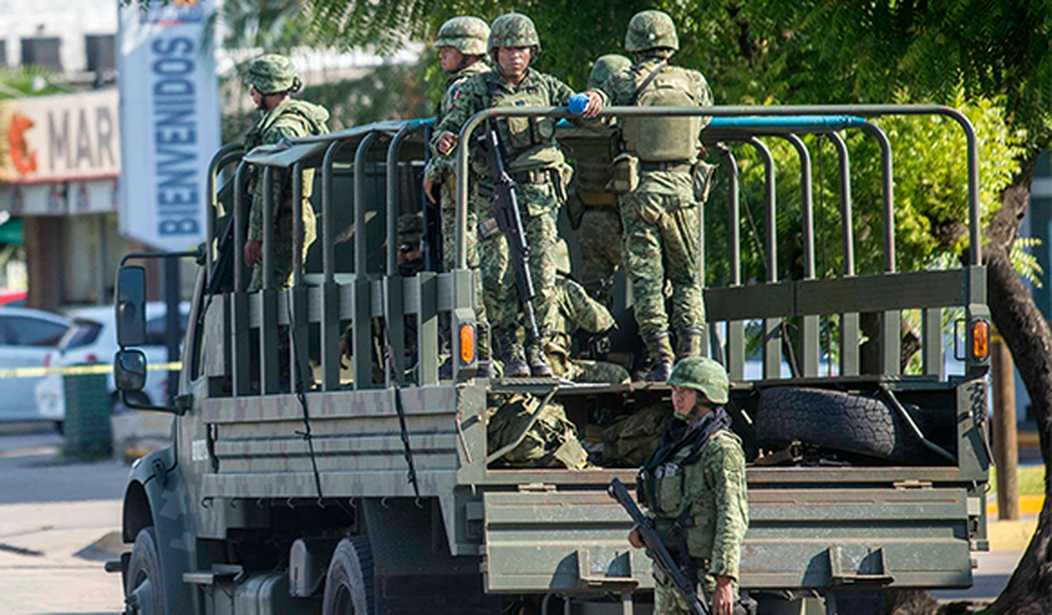Ovidio Guzmán, son of the notorious Sinaloa cartel boss Joaquín “El Chapo” Guzmán, is currently in a maximum security prison in Mexico awaiting extradition to the United States. His capture last week showed why Mexican authorities — including President Andrés Manuel López Obrador — are reluctant to take on the drug cartels that are ravaging several Mexican states.
The younger Guzmán’s capture resulted in the death of 10 special forces soldiers and 19 cartel gunmen. The takedown happened in the Sinaloa cartel stronghold of Culiacan — a city of more than 1 million people. Most of the city was shut down for the day with people cowering in their homes as gun battles erupted all over the city.
López Obrador had a chance to capture Guzmán in 2019 but ended up letting him go when the cartel threatened extreme violence. The president has learned a lot since then. He came into office promising to de-emphasize the war on the cartels, which, of course, only led to more violence. Meanwhile, the flow of illegal drugs — especially opioids — exploded in the United States, which has forced the Biden administration to pressure López Obrador to do something about it.
The Mexican president has resisted so far. But with Biden traveling to Mexico City this weekend, López Obrador apparently thought some kind of gesture was in order.
“Mexico wants to do at least the bare minimum in terms of counter-drug efforts,” said Mike Vigil, the DEA’s former chief of international operations who spent 13 years of his career in Mexico. “I don’t think that this is a sign that there’s going to be closer cooperation, bilateral collaboration, if you will, between the United States and Mexico.”
While capturing a criminal is a win for justice and rule of law, Vigil said, the impact on what he sees as a “permanent campaign against drugs” is nil. “Really what we need to do here in the United States is we need to do a better job in terms of reducing demand.”
In 2021 there was a “Bicentennial Framework for Security, Public Health and Safe Communities” signed with Mexico that was supposed to take a more “holistic” approach to the drug problem, working on both interdiction and the demand side of the equation.
It fell apart fairly quickly.
“The Bicentennial understanding was a change on paper with respect to attacking drug trafficking and violence with a more important focus on what were supposedly public health programs — (but) without any budget,” said Guadalupe Correa-Cabrera, an associate professor at George Mason University. In reality, “Mexico is bending to the United States’ interests.”
That sounds a lot like a Biden plan — grandiose rhetoric, wonderful PR opportunities, and no money to implement it.
But López Obrador’s “hugs not kisses” policy hasn’t slowed the flow of drugs into the U.S., hasn’t lowered the horrific homicide rate in Mexico, nor have the huge resources devoted to social programs that were supposed to alleviate Mexico’s poverty and eliminate a reason for the drug business done anything to raise the standard of living or make people safer.
López Obrador’s government benefits from the detention of Guzmán in several ways. The arrest eases the armed forces’ humiliation after being forced by cartel gunmen to release him in 2019. It may sooth ill-feelings after his administration strictly limited U.S. anti-drug cooperation two years ago. And it may help diminish perceptions that López Obrador — who has frequently visited Sinaloa and praised its people — has gone easier on the Sinaloa cartel than on other gangs.
For four years López Obrador has continued to shred his predecessors’ prosecution of the drug war at every opportunity. Experts say the respite allowed the cartels to get stronger, both in terms of organization and armament.
López Obrador doesn’t see the flow of people or drugs into the U.S. as his problem. And we shouldn’t expect Biden to try and force the Mexican president to see it any other way.










Join the conversation as a VIP Member